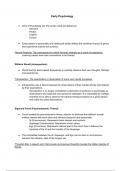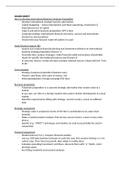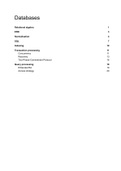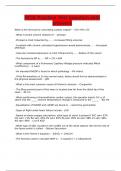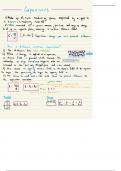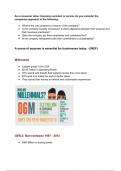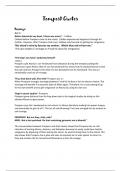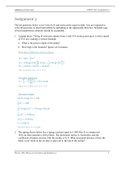BRIONY:
Briony’s compartmentalisation of the world (this links to her fictionalising):
‘Fortune presents her a second chance in the form of an impoverished doctor’ Briony’s play allows
for a secure and compartmentalised resolution in the way real life does not. There is no order to the
world, it is far too complex.
‘Possessed by a desire to have the world just so…controlling demon’
Briony is an innately compartmentalising figure who seeks to impose order on the vicissitudes of reality
(‘unbearably complicated’). It is because of this she makes mistakes and then seeks their justification.
This drives her criminal psychology. ‘Demon’ suggests something malevolent in Briony - sufficiently
universal to exist in childhood and to stretch into adulthood.
‘Model farm’
A metaphor for how Briony conceives fiction as a means of creating order.
‘An unruly world could be made just so’
Briony views fiction as a means of compartmentalising the world and imposing order where there is none.
This provides an insight into her motivation - there is something inherent within her that drives the
mistakes she makes. She seeks to impose order on a disordered world.
Such a thing relates to the book’s more literary trappings: this is not a world so readily ordered as found
in more opulist crime fiction.
Briony’s vivid imagination (this links to her fictionalising + compartmentalising + crime):
‘Representing her country next year at the Berlin Olympics’
Briony imagines herself entering the Olympics as a ‘nettle-slasher’. Such an idea gives us a fleeting idea
into her dissociation with reality.
‘Briony had lost her godly power of creation’
Briony’s fury at the abandonment of her play drives her desire to fantasise and create elsewhere.
‘There was nothing she could not describe’
Briony has a maniacal compulsion for fictionalising and compartmentalising the world around her. She
believes she can fit the world into her understanding.
Briony being deprived of attention (this links to her isolation):
‘This was the project's highest point of fulfilment’
Briony craves her mother’s attention and her delight at her mother’s insincere reaction demonstrates as
much. Such a thing fuels any sympathy we might have for Briony, as we see that her motives are not
entirely self-serving. She is desperate for attention and possibly even equates this with love.
‘Her effective status as an only child, as well as the relative isolation of the Tallis house’ Briony
is socially isolated and starved of affection. In such circumstances, her ‘crime’ can be seen as a
desperate plea for attention. It allows her social engagement and validation, she otherwise might never
truly experience.
‘But her father remained in town…her mother…seemed distant’
Briony is isolated and therefore prone to seeking attention.
, ‘His presence imposed order and allowed freedom’
Absence of Briony’s father has a destabilising effect on the family and means she has no moral centre.
Briony’s egotism (this links to her apathy towards others feelings + egotism):
‘She knew this, but only in a rather arid way; she didn’t really feel it’
Briony appears inherently unable to act upon others’ humanity. Though she recognises it, she is unable to
fully live with its presence and the uncertainty that it brings (her becoming ‘irrelevant’). There is something
psychopathic about this as she views people as devices in part of her machinations.
‘Equal importance…drowning in irrelevance’
Briony fears being irrelevant. This hints at her egotism, but also explains how she views the crime as an
opportunity.
Briony’s misunderstanding (this links to society + compartmentalising):
‘At his insistence she was removing her clothes, and at such speed. She was out of
her blouse…what power did he have over her’
Briony hopelessly misunderstands Robbie and Cecilia’s interaction over the broken vase. Such in her
childish nature that she is unable to reconcile the ‘illogical’ sequence of events and their inherently sexual
nature that she ascribes a mistaken narrative upon them.
‘she was entering the arena of adult emotion’
Briony misunderstands adult emotional complexity because she views it from the perspective of a
child. Robbie’s note to Cecilia is not something she has the emotional nuance to appreciate and so
she reacts to suppress its sexuality and demonises Robbie.
For Briony, the letter introduces ‘something elemental, brutal, perhaps even criminal’
Briony is unable to recognise her sister and Robbie’s sexual desire. She reads the letter as
evidence for a crime, which it is not. It is something accidental, though emotionally charged.
‘Interrupted an attack, a hand-to-hand fight…a realisation of her worst fears’ Briony misinterprets
Cecilia and Robbie’s sex in the library as a violent assault. A crystallisation of her immaturity, itself
something exacerbated by the repressive upbringing she has had that leads sex to be interpreted as
something violent and monstrous.
Briony’s crimes (this links to her misunderstanding):
The Rape:
‘She was witnessing some trick of darkness and perspective’
When Briony sees the rape itself, McEwan stresses the darkness of the area and that her objective view
is not to be trusted.
‘She had no doubt. She could describe him. There was nothing she could not describe’
Briony’s maniacal refrain at the time of the rape. The fact that this is repeated emphasises Briony’s
compulsion.
‘Lola, who was it ?...It was Robbie wasn’t it? It was Robbie…Robbie’
Briony’s questioning turns from interrogative to assertive as she imposes her own perspective on Lola.
In this, Briony’s ‘crime’ is paralleled with Marshall as she obviates the subjectivity of another individual
in order to further her own desires. In her case, it is the desire to compartmentalise the world around
her to fit her fictional framework.
Briony’s compartmentalisation of the world (this links to her fictionalising):
‘Fortune presents her a second chance in the form of an impoverished doctor’ Briony’s play allows
for a secure and compartmentalised resolution in the way real life does not. There is no order to the
world, it is far too complex.
‘Possessed by a desire to have the world just so…controlling demon’
Briony is an innately compartmentalising figure who seeks to impose order on the vicissitudes of reality
(‘unbearably complicated’). It is because of this she makes mistakes and then seeks their justification.
This drives her criminal psychology. ‘Demon’ suggests something malevolent in Briony - sufficiently
universal to exist in childhood and to stretch into adulthood.
‘Model farm’
A metaphor for how Briony conceives fiction as a means of creating order.
‘An unruly world could be made just so’
Briony views fiction as a means of compartmentalising the world and imposing order where there is none.
This provides an insight into her motivation - there is something inherent within her that drives the
mistakes she makes. She seeks to impose order on a disordered world.
Such a thing relates to the book’s more literary trappings: this is not a world so readily ordered as found
in more opulist crime fiction.
Briony’s vivid imagination (this links to her fictionalising + compartmentalising + crime):
‘Representing her country next year at the Berlin Olympics’
Briony imagines herself entering the Olympics as a ‘nettle-slasher’. Such an idea gives us a fleeting idea
into her dissociation with reality.
‘Briony had lost her godly power of creation’
Briony’s fury at the abandonment of her play drives her desire to fantasise and create elsewhere.
‘There was nothing she could not describe’
Briony has a maniacal compulsion for fictionalising and compartmentalising the world around her. She
believes she can fit the world into her understanding.
Briony being deprived of attention (this links to her isolation):
‘This was the project's highest point of fulfilment’
Briony craves her mother’s attention and her delight at her mother’s insincere reaction demonstrates as
much. Such a thing fuels any sympathy we might have for Briony, as we see that her motives are not
entirely self-serving. She is desperate for attention and possibly even equates this with love.
‘Her effective status as an only child, as well as the relative isolation of the Tallis house’ Briony
is socially isolated and starved of affection. In such circumstances, her ‘crime’ can be seen as a
desperate plea for attention. It allows her social engagement and validation, she otherwise might never
truly experience.
‘But her father remained in town…her mother…seemed distant’
Briony is isolated and therefore prone to seeking attention.
, ‘His presence imposed order and allowed freedom’
Absence of Briony’s father has a destabilising effect on the family and means she has no moral centre.
Briony’s egotism (this links to her apathy towards others feelings + egotism):
‘She knew this, but only in a rather arid way; she didn’t really feel it’
Briony appears inherently unable to act upon others’ humanity. Though she recognises it, she is unable to
fully live with its presence and the uncertainty that it brings (her becoming ‘irrelevant’). There is something
psychopathic about this as she views people as devices in part of her machinations.
‘Equal importance…drowning in irrelevance’
Briony fears being irrelevant. This hints at her egotism, but also explains how she views the crime as an
opportunity.
Briony’s misunderstanding (this links to society + compartmentalising):
‘At his insistence she was removing her clothes, and at such speed. She was out of
her blouse…what power did he have over her’
Briony hopelessly misunderstands Robbie and Cecilia’s interaction over the broken vase. Such in her
childish nature that she is unable to reconcile the ‘illogical’ sequence of events and their inherently sexual
nature that she ascribes a mistaken narrative upon them.
‘she was entering the arena of adult emotion’
Briony misunderstands adult emotional complexity because she views it from the perspective of a
child. Robbie’s note to Cecilia is not something she has the emotional nuance to appreciate and so
she reacts to suppress its sexuality and demonises Robbie.
For Briony, the letter introduces ‘something elemental, brutal, perhaps even criminal’
Briony is unable to recognise her sister and Robbie’s sexual desire. She reads the letter as
evidence for a crime, which it is not. It is something accidental, though emotionally charged.
‘Interrupted an attack, a hand-to-hand fight…a realisation of her worst fears’ Briony misinterprets
Cecilia and Robbie’s sex in the library as a violent assault. A crystallisation of her immaturity, itself
something exacerbated by the repressive upbringing she has had that leads sex to be interpreted as
something violent and monstrous.
Briony’s crimes (this links to her misunderstanding):
The Rape:
‘She was witnessing some trick of darkness and perspective’
When Briony sees the rape itself, McEwan stresses the darkness of the area and that her objective view
is not to be trusted.
‘She had no doubt. She could describe him. There was nothing she could not describe’
Briony’s maniacal refrain at the time of the rape. The fact that this is repeated emphasises Briony’s
compulsion.
‘Lola, who was it ?...It was Robbie wasn’t it? It was Robbie…Robbie’
Briony’s questioning turns from interrogative to assertive as she imposes her own perspective on Lola.
In this, Briony’s ‘crime’ is paralleled with Marshall as she obviates the subjectivity of another individual
in order to further her own desires. In her case, it is the desire to compartmentalise the world around
her to fit her fictional framework.

